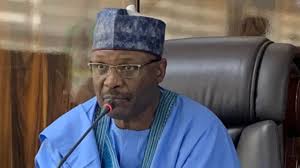The Independent National Electoral Commission (INEC), is set to review the use of Permanent Voters Cards, PVCs, as the only mode of identification during elections with computer generated slips to aid the process.
INEC National Chairman Prof. Mahmood Yakubu met with Resident Electoral Commissioners, RECs, from the 36 states and the FCT, to brainstorm on the outcome of the 2023 general elections as well as the numerous off-cycle elections conducted by the commission.
Prof Mahmood said that “The use of the Bimodal Voter Accreditation System, (BVAS) and Permanent Voters’ Cards, (PVC), as the sole means of identification for voter accreditation on election day be reviewed.”
He said “Those who already have the PVCs can still use them to vote, but going forward, computer-generated slips issued to the voter or even downloaded from the Commission’s website will suffice for voter accreditation”.
Prof Mahmood added that this initiative will not only save cost but will also eliminate the issues around the collection of PVCs and the diabolical practice of buying up the cards from voters in order to disenfranchise them.
Post election report
Prof Mahmood announced that the Commission has released its 524-page main report on the election, a copy of which is available on its website.
He disclosed that they had consulted internally with INEC officials and externally with all major stakeholders to arrive at the report.
“The Commission has identified 142 recommendations dealing with the general state of preparedness, voter management, voter education and public communication, political parties and candidate management, electoral operations and logistics management, election officials and personnel, partnership and collaboration, monitoring and supervision, election technology, voting and result management, election security, electoral offences and the electoral legal framework”.
Read Also: Lawmaker Urges INEC Takeover of Local Elections for Transparency
INEC Counters SERAP’s Claims On Prosecution Of 2023 Electoral Offenders
Prof. Mahmood maintained that out of the 142 recommendations, 86 require administrative action by the Commission, which are reasons for the initial engagement with the Resident Electoral Commissioners, RECs, because of their frontline role in the implementation of the recommendations.
“This is followed by 48 recommendations that require action by a variety of stakeholders, including security agencies, mobile network operators, statutory bodies, political parties, transport unions, civil society organisations and the media”.

Prof Mahmood noted that on the legal review, there are eight recommendations that require legislative action by the National Assembly and that the Commission will make a presentation to the Joint Committee of the Senate and House of Representatives on Electoral Matters as they continue to deliberate on electoral reform.
“The major highlights of the Commission’s recommendations is the imperative of legal clarity in result management, with regard to manual transfer versus the electronic transmission of results”.
Special and Diaspora voting
Prof Mahmood also disclosed that the review report also contains recommendations on early/special voting for the millions of Nigerians who do not vote at the moment on account of the roles they play during elections such as INEC officials, security personnel, ad hoc staff, observers and journalists who are deployed outside the places where they registered to vote.

He noted that there are also ‘recommendations in support of diaspora voting, the unbundling of the Commission with the establishment of electoral offences tribunal and a separate agency to handle the registration and regulation of political parties’.
Collaboration with NIMC/ NPC
Prof. Mahmood stated that the Commission will step up action on voter access and distribution to polling units.
“As a matter of urgency, the Commission also intends to develop protocols for the cleaning up of the voters’ register in collaboration with other agencies such as the National Identity Management Commission, NIMC, and the National Population Commission, (NPC).
“Other areas of reform include advocacy for affirmative action for greater participation of under-represented groups, a more robust voter education and public communication to combat fake news and misinformation”.
He said that the Commission intends to review the mechanisms for a more effective implementation of agreements on logistics with the transport unions and other service providers by consolidating on the recent experience with early deployment and commencement of elections in the recent Ondo State Governorship election.
During the meeting hardcopies of the General Election and Review reports were presented to the public while the soft copy will be uploaded to the Commission’s website.
Emmanuel Ukoh


Comments are closed.